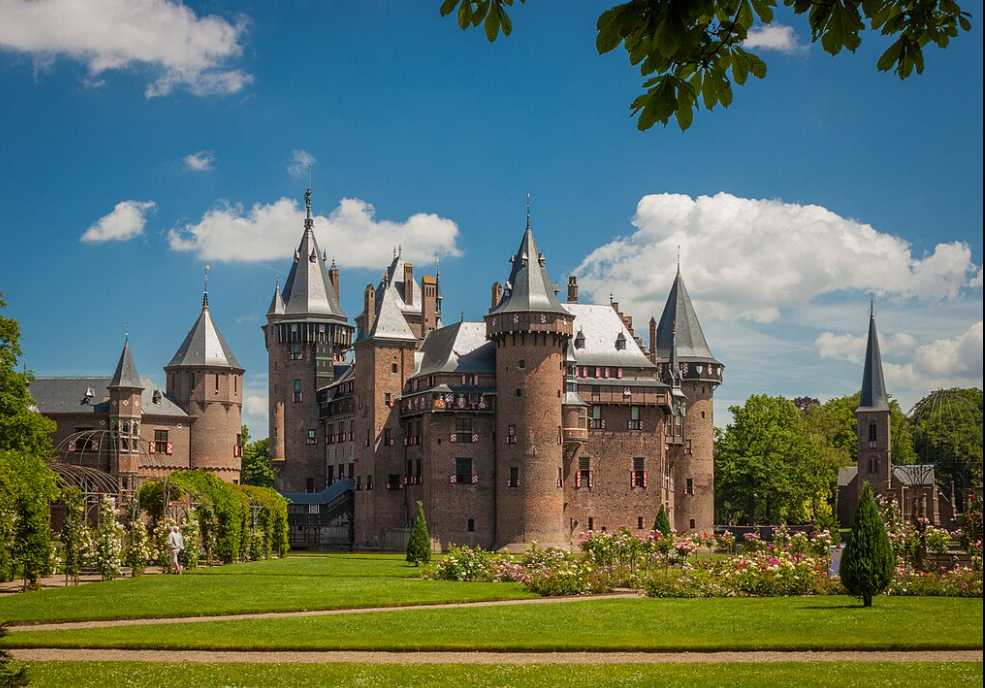The most beautiful castles from around the world, each known for its architecture, history, and stunning surroundings:
1. Neuschwanstein Castle (Germany)
Location: Bavaria, Germany
Highlights: Perched on a rugged hill, Neuschwanstein Castle is often called a “fairy-tale castle.” Built in the 19th century by King Ludwig II, its Romanesque architecture and dramatic mountain backdrop make it one of the most visited castles in the world.
2. Château de Chambord (France)
Location: Loire Valley, France
Highlights: A masterpiece of French Renaissance architecture, this massive château features elegant towers and extensive grounds. Its double-helix staircase is rumored to have been designed by Leonardo da Vinci.
3. Alhambra (Spain)
Location: Granada, Spain
Highlights: The Alhambra is a stunning example of Moorish architecture. Its intricately designed walls, arches, and courtyards are set against the backdrop of the Sierra Nevada mountains, blending both beauty and history.
4. Edinburgh Castle (Scotland)
Location: Edinburgh, Scotland
Highlights: Situated on an extinct volcanic rock, this medieval fortress dominates Edinburgh’s skyline. It’s rich in history and offers breathtaking views of the city and surrounding landscapes.
5. Himeji Castle (Japan)
Location: Himeji, Japan
Highlights: Known as the "White Heron Castle," Himeji is a striking, white castle that dates back to the 14th century. Its stunning design and well-preserved structure make it one of Japan’s most iconic castles.
6. Bran Castle (Romania)
Location: Bran, Romania
Highlights: Often referred to as “Dracula’s Castle,” Bran Castle is perched on the edge of a cliff and has a gothic, mysterious charm. It’s set amidst the beautiful Carpathian mountains and is a major tourist attraction in Transylvania.
7. Pena Palace (Portugal)
Location: Sintra, Portugal
Highlights: With its bright colors and eclectic architecture, Pena Palace looks like something out of a fairy tale. Set high on a hill overlooking the lush Sintra mountains, it combines Gothic, Renaissance, and Moorish styles.
8. Mont Saint-Michel (France)
Location: Normandy, France
Highlights: Rising dramatically from a tidal island, Mont Saint-Michel is a medieval abbey and fortress surrounded by a quaint village. Its mystical appearance, especially at high tide, makes it one of the most enchanting castles in the world.
9. Prague Castle (Czech Republic)
Location: Prague, Czech Republic
Highlights: One of the largest ancient castles in the world, Prague Castle dominates the city’s skyline. Its Gothic architecture and historical significance are matched by stunning views of Prague’s old town.
10. Windsor Castle (England)
Location: Windsor, England
Highlights: One of the residences of the British royal family, Windsor Castle is the oldest and largest inhabited castle in the world. Its blend of Georgian, Gothic, and medieval architecture adds to its grandeur and charm.
1. Neuschwanstein Castle (Germany)
Location: Bavaria, Germany
Highlights: Perched on a rugged hill, Neuschwanstein Castle is often called a “fairy-tale castle.” Built in the 19th century by King Ludwig II, its Romanesque architecture and dramatic mountain backdrop make it one of the most visited castles in the world.
2. Château de Chambord (France)
Location: Loire Valley, France
Highlights: A masterpiece of French Renaissance architecture, this massive château features elegant towers and extensive grounds. Its double-helix staircase is rumored to have been designed by Leonardo da Vinci.
3. Alhambra (Spain)
Location: Granada, Spain
Highlights: The Alhambra is a stunning example of Moorish architecture. Its intricately designed walls, arches, and courtyards are set against the backdrop of the Sierra Nevada mountains, blending both beauty and history.
4. Edinburgh Castle (Scotland)
Location: Edinburgh, Scotland
Highlights: Situated on an extinct volcanic rock, this medieval fortress dominates Edinburgh’s skyline. It’s rich in history and offers breathtaking views of the city and surrounding landscapes.
5. Himeji Castle (Japan)
Location: Himeji, Japan
Highlights: Known as the "White Heron Castle," Himeji is a striking, white castle that dates back to the 14th century. Its stunning design and well-preserved structure make it one of Japan’s most iconic castles.
6. Bran Castle (Romania)
Location: Bran, Romania
Highlights: Often referred to as “Dracula’s Castle,” Bran Castle is perched on the edge of a cliff and has a gothic, mysterious charm. It’s set amidst the beautiful Carpathian mountains and is a major tourist attraction in Transylvania.
7. Pena Palace (Portugal)
Location: Sintra, Portugal
Highlights: With its bright colors and eclectic architecture, Pena Palace looks like something out of a fairy tale. Set high on a hill overlooking the lush Sintra mountains, it combines Gothic, Renaissance, and Moorish styles.
8. Mont Saint-Michel (France)
Location: Normandy, France
Highlights: Rising dramatically from a tidal island, Mont Saint-Michel is a medieval abbey and fortress surrounded by a quaint village. Its mystical appearance, especially at high tide, makes it one of the most enchanting castles in the world.
9. Prague Castle (Czech Republic)
Location: Prague, Czech Republic
Highlights: One of the largest ancient castles in the world, Prague Castle dominates the city’s skyline. Its Gothic architecture and historical significance are matched by stunning views of Prague’s old town.
10. Windsor Castle (England)
Location: Windsor, England
Highlights: One of the residences of the British royal family, Windsor Castle is the oldest and largest inhabited castle in the world. Its blend of Georgian, Gothic, and medieval architecture adds to its grandeur and charm.
The most beautiful castles from around the world, each known for its architecture, history, and stunning surroundings:
1. Neuschwanstein Castle (Germany)
Location: Bavaria, Germany
Highlights: Perched on a rugged hill, Neuschwanstein Castle is often called a “fairy-tale castle.” Built in the 19th century by King Ludwig II, its Romanesque architecture and dramatic mountain backdrop make it one of the most visited castles in the world.
2. Château de Chambord (France)
Location: Loire Valley, France
Highlights: A masterpiece of French Renaissance architecture, this massive château features elegant towers and extensive grounds. Its double-helix staircase is rumored to have been designed by Leonardo da Vinci.
3. Alhambra (Spain)
Location: Granada, Spain
Highlights: The Alhambra is a stunning example of Moorish architecture. Its intricately designed walls, arches, and courtyards are set against the backdrop of the Sierra Nevada mountains, blending both beauty and history.
4. Edinburgh Castle (Scotland)
Location: Edinburgh, Scotland
Highlights: Situated on an extinct volcanic rock, this medieval fortress dominates Edinburgh’s skyline. It’s rich in history and offers breathtaking views of the city and surrounding landscapes.
5. Himeji Castle (Japan)
Location: Himeji, Japan
Highlights: Known as the "White Heron Castle," Himeji is a striking, white castle that dates back to the 14th century. Its stunning design and well-preserved structure make it one of Japan’s most iconic castles.
6. Bran Castle (Romania)
Location: Bran, Romania
Highlights: Often referred to as “Dracula’s Castle,” Bran Castle is perched on the edge of a cliff and has a gothic, mysterious charm. It’s set amidst the beautiful Carpathian mountains and is a major tourist attraction in Transylvania.
7. Pena Palace (Portugal)
Location: Sintra, Portugal
Highlights: With its bright colors and eclectic architecture, Pena Palace looks like something out of a fairy tale. Set high on a hill overlooking the lush Sintra mountains, it combines Gothic, Renaissance, and Moorish styles.
8. Mont Saint-Michel (France)
Location: Normandy, France
Highlights: Rising dramatically from a tidal island, Mont Saint-Michel is a medieval abbey and fortress surrounded by a quaint village. Its mystical appearance, especially at high tide, makes it one of the most enchanting castles in the world.
9. Prague Castle (Czech Republic)
Location: Prague, Czech Republic
Highlights: One of the largest ancient castles in the world, Prague Castle dominates the city’s skyline. Its Gothic architecture and historical significance are matched by stunning views of Prague’s old town.
10. Windsor Castle (England)
Location: Windsor, England
Highlights: One of the residences of the British royal family, Windsor Castle is the oldest and largest inhabited castle in the world. Its blend of Georgian, Gothic, and medieval architecture adds to its grandeur and charm.
0 Commentaires
0 Parts
1KB Vue













